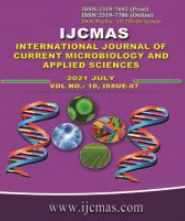


 National Academy of Agricultural Sciences (NAAS)
National Academy of Agricultural Sciences (NAAS)

|
PRINT ISSN : 2319-7692
Online ISSN : 2319-7706 Issues : 12 per year Publisher : Excellent Publishers Email : editorijcmas@gmail.com / submit@ijcmas.com Editor-in-chief: Dr.M.Prakash Index Copernicus ICV 2018: 95.39 NAAS RATING 2020: 5.38 |
An experiment was carried out to study the effect of inclusion of different locally available tree barks in total mixed ration on serum biochemical profile and parasitic load in Nellore ram lambs. A ninety day growth trail was conducted with twenty eight Nellore Jodipi ram lambs (13.72 ± 0.05 kg B.Wt) which were randomly (CRD) allotted to four treatment groups with seven animals per treatment and were fed total mixed ration T1 (control), T2 (10% Neem bark), T3 (10% tamarind bark), T4 (10% Acacia bark). All the four total mixed rations were iso-nitrogenous. Feed intake was recorded daily while, body weights were recorded at weekly intervals. Blood samples were collected early in the morning at day 0 and 90 of the study. Faecal samples were collected early in the morning at fort -nightly interval. Serum biochemical profile of ram lambs at the beginning of the experiment indicated non-significant (P > 0.05) difference for serum glucose, total protein, globulin, ALT, AST and ALT: AST, cholesterol, triglycerides except for albumin (P<0.05). Serum biochemical profile at the end of the experiment revealed non-significant (P > 0.05) difference for serum glucose, total protein, albumin, globulin, ALT, AST and ALT: AST, but the concentration of cholesterol and triglycerides significantly (P< 0.05) reduced in the treatment groups supplemented with different tree barks when compared to control group. There was no significant (P > 0.05) difference in the faecal egg count of ram lambs fed total mixed rations containing different tree barks at 10% level when compared with control group throughout the experimental period. The egg count is reduced towards at the end of the experiment in the treatment groups supplemented with different tree barks. While, the egg count is increased towards the end of the experiment in control group. Addition of different tree barks in the diet didn’t have negative impact overall health status of the animal.
 |
 |
 |
 |
 |